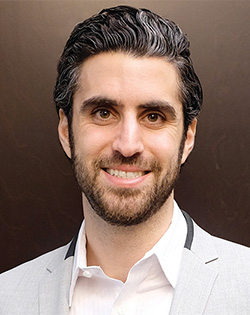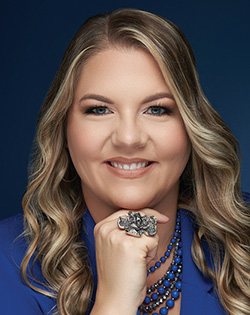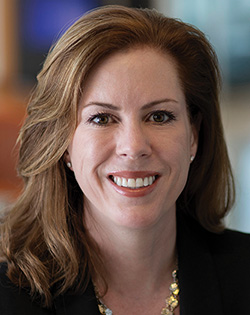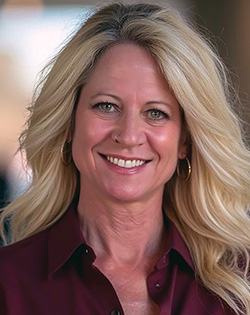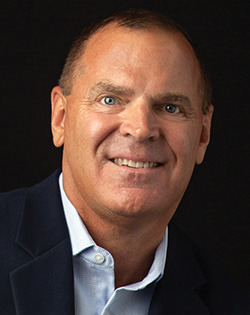

8:00 AM - 9:15 AM
In our world of information whiplash, health plan and wellness professionals can often feel like it’s an ongoing battle in an unwinnable war. The food system is flooded with ultra-processed products, many of which are even marketed as "healthy". We are all impacted by an industrialized agriculture system that prioritizes profit over nutrition. Weight loss trends offer conflicting approaches, leaving us all overwhelmed and confused. Meanwhile, the wildfire of GLP-1 medications are in nearly every weight loss conversation. Do they fix the root of the problem? Are they a safe and effective long-term strategy? With continued escalation of the incidence of heart disease, diabetes, Alzheimer’s, and cancer, the stakes couldn’t be higher.
Join Registered Dietitian Nutritionist Zonya Foco, as she reveals the real forces shaping how we respond to the food environment—and why understanding who we are up against is the first step toward meaningful change. Best of all, Zonya will equip you with powerful, single-phrase, evidence-based responses to the tough nutrition questions you hear every day: Are seed oils bad, and is butter better? Is 100g of protein a day the new gold standard? Is there a way to avoid or stop using GLP-1s? She will turn confusion into confidence and spark lasting “tipping points” for change. You’ll leave this session inspired, informed, and ready to lead with clarity in a world that desperately needs it.
After this session, participants will be able to:
- Identify key factors in today’s food system—such as ultra-processed ingredients, additives, and industrialized agriculture—that contribute to poor health outcomes, including heart disease, diabetes, Alzheimer’s, and cancer.
- Define the impact of the current GLP-1 trend and understand alternative and complementary strategies.
- Communicate clear, concise, and research-backed responses to common nutrition questions.
Downloads
9:45 AM - 10:45 AM
You’ve heard the buzz; Individual coverage (ICHRA) adoption is rising fast. But is it the right move for your organization? This session cuts through the noise with a practical, employer-focused look at ICHRAs. We’ll unpack the potential savings but also explore the less-advertised tradeoffs: administrative complexity, equity concerns, and differences between the group and individual markets that impact both employers and employees. Whether you’re ICHRA-curious or just looking for fresh cost-containment ideas, you’ll leave with a clear-eyed view of what this model really means in practice—-beyond the vendor sales pitch.
Learning Objectives:
- Discuss when ICHRAs make sense and when they might not.
- Explain how to design contributions that balance cost, equity, and compliance.
- List what to expect from an administrative standpoint during enrollment as well as year-round.
Downloads
9:45 AM - 10:45 AM
Employers are facing a growing crisis: traditional mental health solutions aren't meeting the needs of their workforce. In response, a new class of evidence-based, fast-acting treatments is emerging, with the potential to significantly reduce symptoms of depression, anxiety, PTSD, and burnout. This session brings together a panel of benefits innovators and clinical experts to explore how employers and unions are beginning to integrate these breakthrough therapies into their health plans. Attendees will learn what’s working, what to consider when evaluating these benefits, and how to lead responsibly in a rapidly evolving landscape.
Learning Objectives
- Understand how new, rapid-acting mental health treatments are being safely and effectively offered within employer-sponsored plans.
- Explore clinical outcomes, cost implications, and risk management strategies from real-world implementations.
- Learn how to evaluate, pilot, and scale cutting-edge mental health solutions for diverse employee populations
Downloads
9:45 AM - 10:45 AM
Cybercrime incidents are costly and nearly unavoidable. Successful incidents can paralyze an employer's physical and remote operations, compromise an organization's confidential information and result in costly mitigation activities. Employee benefit plans are particularly susceptible to cybercrime due to the large volume of transactions they conduct, the value of their suspense accounts and investment portfolios, and the range of access rights they grant. However, there are proactive measures that can insulate employers from these outcomes. HIPAA, and other privacy-related laws and regulations offers roadmaps for building an employer's cyber defense strategy.
Learning Objectives:
- Understand the prevalence and opportunity for cybercrime, as well as the range of attack architectures and specific malware variants most frequently deployed against human resources operations and total rewards-related functions.
- Apply the principles and requirements of HIPAA with respect to risk assessment, management and preparedness as solutions to the potential cybercrime incidents.
- Develop and implement organizational cybersecurity contingency plans designed to identify, respond to, and proactively mitigate the individual and organizational harms that arise from successful cybercrime incidents.
Downloads
9:45 AM - 10:45 AM
As the workplace evolves, so must our understanding of what true employee well-being looks like. In 2026, three critical trends are shaping the future of holistic health at work: a deepening focus on mental health, the normalization of menopause as a workplace issue, and a broader organizational shift toward care-centered cultures. This session will share findings from our latest research, offering data-driven recommendations for HR and benefits leaders. We’ll explore shifting workforce expectations to help you shape a future-focused well-being strategy grounded in what employees truly need. Attendees will walk away with actionable insights to create environments where empathy, equity, and support are embedded into the foundation of the employee experience.
Learning Objectives:
- Understand how 2026 trends are expanding the definition of mental health support—from reactive services to proactive, culturally responsive care integrated into the everyday work experience.
- Discuss how leading organizations are responding to the needs of workers experiencing menopause through benefits, training, and inclusive workplace policies and discover why this matters now more than ever.
- Learn the impact organizational care has on employees at work and beyond, as well as how you can shift from viewing well-being as a one-time box to check to an ongoing sustained effort.
Downloads
11:00 AM - 12:00 PM
Menopause is having a cultural moment. It seems like information is everywhere, but new research reveals that employees are still struggling to find trusted, factual sources of to answer their menopause questions. The result? Unmanaged symptoms, reduced productivity, and talent heading for the exit. Join Maven Clinic to explore our groundbreaking research on how this information overload is reshaping employee expectations for menopause benefits. Discover how evidence-based, clinically backed support can help your benefits cut through the confusion and deliver what employees actually need: Trusted guidance that transforms overwhelming options into clear care pathways.
Learning Objectives:
- Explain how menopause information overload is creating decision paralysis instead of support
- Discuss how to find a menopause benefits partner that offers clear, clinically-sound guidance
- Learn how to calculate the ROI of menopause benefits done right
Downloads
11:00 AM - 12:00 PM
This case study showcases a company that’s not just investing in employee well-being—It’s rewriting the rules. Refusing to let cost or access stand in the way, Kloeckner Metals Corporation is collaborating with existing partners to help implement its bold ideas to make mental health care more affordable and accessible for every employee. The company is also pursuing fresh, innovative solutions to expand offerings and address employees' changing needs. With a workforce made up largely of men in operational and industrial roles, the company is confronting stigma head-on normalizing mental health conversations at work and breaking the silence that too often surrounds men’s health in general. Addressing mental, physical and financial well-being together, Kloeckner is putting employee well-being first—making support not just available but also expected and easy to reach.
Learning Objectives:
- Learn how to leverage existing partners, including medical carriers, to implement non-standard, employee-driven solutions that expand access to care.
- Analyze how Kloeckner’s vulnerable leadership style and open sharing of their own mental health experiences helped break stigma and inspired the entire workforce to engage.
- Discuss the value of high-impact, year-round benefits education to increase awareness and usage among participants.
-
JoAnne Thomas, CEBS
-
 Kathi McMullan
Kathi McMullan
Downloads
11:00 AM - 12:00 PM
Employers are just beginning to realize how much obesity is costing them in both medical and productivity terms. They are stuck between the ingrained but unfair stigma that obesity is the employee’s fault and the science-based reality that obesity is a disease with new and evolving, effective treatments that come at a cost.
The obesity rate in the US is 40.3% and it is highest amongst working-age adults. Obesity leads to over 200 co-morbidities, giving it a causal connection to expensive health plan cost drivers such as type 2 diabetes, cancer, heart disease and stroke. Unfortunately, obesity remains perhaps the only chronic disease not widely covered by major health plans.
Learning Objectives:
- Learn the full array of current obesity treatment options
- Understand the cost of obesity in the work force
- Explain the importance of access to preventive care including behavioral counseling, medications and nutritional therapy.
Downloads
11:00 AM - 12:00 PM
Zones of Engagement are the most effective examples of employee or customer engagement in the world. What can the well-being industry learn from other industries when it comes to getting employees to care about—and sustain interest in—their own well-being? It turns out, quite a bit. For decades, we’ve been competing for attention with the likes of Netflix, TikTok, Instagram, and other global engagement giants—and losing. This session will explore how the best brands on Earth inspire loyalty, personalization, grassroots advocacy, emotional connection, and evolution—and how those same strategies can transform how we engage people in their own well-being.
Learning Objectives:
- Take best-in-class communication strategies from leading brands and apply them to well-being
- Learn strategies to personalize and humanize outreach efforts
- Understand how generational differences can be leveraged to enhance a well-being program
- Learn how messaging, tone, and influencers can foster greater connection and trust
- Discover communication frameworks that lead to higher participation and lasting behavioral change
Downloads
1:15 PM - 2:15 PM
As organizations scale across borders and shift toward hybrid or post acquisition models, HR disciplines that once worked independently now collide, often chaotically. Benefits packages get redesigned without accounting for cultural or regional wellness needs, while performance systems are rolled out without regard for engagement or mental health trends across geographies. This session explores the real cost of siloed HR operations in global change environments and how to fix it. Drawing on transitions with mergers and acquisitions (M&A), payroll harmonization, and multinational HR restructuring, this session offers a roadmap for synchronizing HR strategies through an adaptive, change-ready framework rooted in integration, empathy and governance.
Learning Objectives:
- Understand how globalization, hybrid work, and change initiatives intensify disconnection across HR functions and learn how to realign them.
- Explore case-based strategies to integrate benefits, performance, and wellness during M&A, international scaling, or workforce restructuring.
- Learn to design a cohesive global HR model that balances regulatory compliance, cultural nuance, and employee trust across regions.
Downloads
1:15 PM - 2:15 PM
If you’ve tried a centers of excellence (COE) solution in the past and didn’t see results, you’re not alone. But Orange County Public Schools (OCPS) has had a different experience. The system has saved more than $10 million since 2021, all while connecting teachers and staff with excellent local surgeons through a modern COE approach. Join us for a case study with Beth Curran, senior director, risk management, OCPS and Lantern to explore how OCPS tackled musculoskeletal costs, its second-highest spend category, and reinvested significant savings into the system.
Learning Objectives:
- List the features OCPS looked for in a COE solution, including affordability for teachers and staff
- Explain the benefits of a locally focused COE and how to find one
- Understand how trustworthy and hard-dollar savings should be calculated when considering a COE
Downloads
1:15 PM - 2:15 PM
As healthcare costs rise and employee expectations evolve, employers are seeking innovative ways to deliver better benefits without breaking the bank. In this session, the City of McAllen shares its journey implementing a direct care model—eliminating traditional insurance barriers and creating direct relationships between providers and employees. Attendees will learn how this approach improves access to care, supports longitudinal health, reduces costs, and enhances overall employee satisfaction. Real-world outcomes and practical guidance will equip attendees to evaluate direct care as part of their benefits strategy.
Learning Objectives:
- Understand the structure and value of direct care and how it differs from traditional insurance-based models.
- Learn how focusing on preventive, longitudinal care can reduce costs while driving better employee outcomes and satisfaction.
- Gain actionable insights into launching and managing a direct care model within your organization.
Downloads
1:15 PM - 2:15 PM
Corporate wellness programs often falter, usually not for lack of ideas but for lack of theory. In this session, participants will learn how to ground interventions in two proven frameworks for behavior change: the health belief model and the social ecological model. Through concise overviews, real-world corporate examples, and an interactive design exercise, attendees will learn how to frame communications, shape environmental cues, and time activities so that healthy behaviors stick. This session equips HR and benefits leaders with both the “why” and the “how,” offering a replicable roadmap for moving from one-off campaigns to a cohesive, theory-driven wellness strategy.
Learning Objectives:
- Identify and recall the core components of two public health behavior change frameworks.
- Convert theoretical constructs into at least four concrete wellness tactics (such as message framing, incentive design, environmental prompts, and social cues).
- Explain how to build a simple program map that aligns selected theoretical constructs with targeted communications and activities.
Downloads
2:45 PM - 3:45 PM
A small portion of employees often account for the majority of healthcare costs—and they’re typically the most difficult to support effectively. This session will break down the key differences between high-risk, chronic conditions and high-cost, one-time medical events. It will also outline practical strategies employers can use to address both challenges. Whether building a new health benefits plan or updating an existing one, HR and benefits leaders will gain clear guidance to help manage risk, support employee health, and control costs.
Learning Objectives:
- Understand the difference between chronic high-risk care and episodic high-cost care in employee populations.
- Learn which interventions, including care coordination, centers of excellence and digital tools, work best for each type.
- Review real-world examples and proven strategies from employers and health plans.
Downloads
2:45 PM - 3:45 PM
This session will explore how building financial resilience into plan design leads to better health outcomes and sustainable cost savings for employers. Access to equitable, interest-free financing can transform how people engage with care. By improving financial capacity, reducing stress and helping employees take a more proactive and preventive approach to care-seeking behavior, we can prevent more serious and costly health conditions over time.
Participants will walk away with a clear view of how financing strategies create a stronger, more efficient system—one that empowers employees and strengthens the financial foundation of their health plans for the long term:
Learning Objectives:
- Learn how to support employees when they are navigating the financial aspects of care.
- Gain perspective on the negative effects that existing financing and collections practices have on your employees’ ability and desire to seek care proactively.
- Discover how organizations benefit from reviewing the impact of current financial accounts and implementing healthcare financing as a health, wellness, and financial benefit for employees.
Downloads
2:45 PM - 3:45 PM
The session will cover recent litigation regarding fiduciary liability as it applies to self-insured health plans. In addition, we will review the status of claims against PBMs and other healthcare providers. Further, we will discuss compliance with recent law changes, such as those relating to HSAs, ICHRAs, the MHPA, telehealth and preventive care.
Learning Objectives:
- Summarize a review of potential fiduciary claims against sponsors of self-insured health plans.
- Learn about recent legal changes regarding HSAs, ICHRAs, the MHPA, telehealth and preventive care.
- Discuss tax-related issues concerning health benefits.
Downloads
2:45 PM - 3:45 PM
This presentation will walk through participatory (activity-only) and health contingent (outcome- based) wellness incentive programs. We will also discuss the legal parameters around both programs and the applicability of the non-discrimination rules. We will then discuss designing, implementing, and communicating a wellness program using the City of Phoenix’s wellness program as a case study. The City of Phoenix has over 14,000 employees performing various roles, from desk work to outside physical labor.
Learning Objectives:
- Learn about the differences between participatory and health-contingent wellness incentive program options.
- Understand the different non-discrimination rules for each type of program.
- Discover how to design, implement, and communicate wellness programs to a diverse workforce.
Downloads
4:00 PM - 5:00 PM
Pharmacy benefit management (PBM) operational regulations are fluctuating. There are mergers, sales, and skyrocketing drug prices, and the pace of changes in the pharmacy benefits landscape is intensifying. How can brokers and employers keep up? This session will cover how current and future changes in the PBM world may impact benefit plans as well as smart strategies you can implement to not only avoid chaos but actually help your plan and your employees thrive.
Learning Objectives:
- Understand how new and pending legislation and public scrutiny will impact PBM operations.
- Learn how employers can prepare for expanded use of GLP-1s, gene therapy, and other new specialty medications.
- Discuss the patient-centric tactics that can help you curb costs and prepare for the future.
Downloads
4:00 PM - 5:00 PM
Joy is not a distant destination—It’s a skill we can cultivate and strengthen over time. Central to our wellbeing, cognitive performance and professional fulfillment, joy is a powerful antidote to burnout. In this session, participants will learn how to intentionally create joy in their daily lives, using insights from science and leadership research. By understanding the dynamics of joy, we can improve not only our individual wellbeing but also our overall work environment. Through practical exercises and evidence-based strategies, this session will empower you to bring more joy into your professional life, enhancing productivity, engagement, and resilience.
Learning Objectives:
- Understand the key differences between joy and happiness and explore how true joy is deeply connected to purpose, gratitude, and human connection.
- Participate in interactive exercises designed to elicit joy and positive wellbeing in the workplace.
- Explore nine actionable ways to cultivate joy and foster a more positive, energized, and resilient work environment.
-
.
Downloads
4:00 PM - 5:00 PM
This case study will describe a real-life fraudulent “mommy makeover” scheme, where a health plan paid out millions of dollars for plastic surgery services that were covered up as medically necessary benefits. Along the way, we will explore the plan’s architecture, including pricing arrangements and monitoring requirements, as well as their attempts to prevent and respond to high-cost claims, including investigations and litigation. The session will conclude with preventive strategies all health plans can take to ensure this doesn’t happen to you!
Learning Objectives:
- To detect early warning signs of fraud within your health plan.
- Understand the risk of certain health plan provisions, such as generous out-of-network benefits.
- Explain three methods for preventing instances of fraud in your health plan.
Downloads
4:00 PM - 5:00 PM
The future of employee benefits is centered on prioritizing holistic well-being and flexible solutions. Lifestyle spending accounts (LSAs) are emerging as a cornerstone of this shift, offering powerful ways to support physical, mental, and financial wellness. This session will explore how organizations can use Espresa’s platform to build innovative LSA and well-being programs that strengthen culture, improve health outcomes, and optimize budgets.
Learning Objectives:
- Discover how to design LSA and well-being programs that balance inclusivity and budget constraints.
- Review real-world examples of lifestyle benefits delivering measurable VOI.
- Discuss strategies for communicating and promoting benefits to maximize engagement and impact.
Downloads
8:00 AM - 9:00 AM
Gwinnett County, Georgia has been awarded one of Atlanta's Healthiest Employers every year since 2020 and has been on the list of the 100 Healthiest Workplaces in America since 2022. But the story of their success started nearly ten years prior, and includes all the bumps, bruises, and barriers you would expect, as well as some you wouldn't! Join representatives Karissa Calvert and Tim Lao from the Gwinnett County Board of Commissioners for a first-person re-telling of their wellness program’s evolution including the strategies that worked, the lessons learned from their failures, and how they got employees engaged and excited about wellness.
Learning Objectives:
- List examples of wellness program lessons that can be learned from failures.
- Explore opportunities to meet your employees where they are.
- Explain the strategic advantages of taking a holistic approach to wellness.
Downloads
8:00 AM - 9:00 AM
This session will demonstrate how a large (2000+ employees), spread out (80+ markets) self-insured employer, Dupré Logistics, decided to implement direct primary care for its employees. It will also discuss the timing, logistics, communications, and learnings from implementation and the first year of the benefit. We will have the perspectives of the broker, employer and solutions partner represented.
Learning Objectives:
- Explain why a large self-insured employer would implement direct primary care.
- Discuss how to implement direct primary care at scale.
- Explore best practices and areas to avoid in implementing direct primary care.
Downloads
8:00 AM - 9:00 AM
Joy is not a distant destination—It’s a skill we can cultivate and strengthen over time. Central to our wellbeing, cognitive performance and professional fulfillment, joy is a powerful antidote to burnout. In this session, participants will learn how to intentionally create joy in their daily lives, using insights from science and leadership research. By understanding the dynamics of joy, we can improve not only our individual wellbeing but also our overall work environment. Through practical exercises and evidence-based strategies, this session will empower you to bring more joy into your professional life, enhancing productivity, engagement, and resilience.
Learning Objectives:
- Understand the key differences between joy and happiness and explore how true joy is deeply connected to purpose, gratitude, and human connection.
- Participate in interactive exercises designed to elicit joy and positive wellbeing in the workplace.
- Explore nine actionable ways to cultivate joy and foster a more positive, energized, and resilient work environment.
Downloads
8:00 AM - 9:00 AM
The opioid crisis in the U.S. is not over. Each year, surgery alone accounts for 45 million new opioid prescriptions and from there, results in three million new individuals suffering from an opioid addiction. At the root of these staggering numbers is a systemic issue of overprescription. In this session, we will explore how providers and plans can use AI to address overprescription and hopefully prevent addiction before it begins.
Learning Objectives:
- Understand how to identify prescribers who drive opioid-related dependency and cost.
- Learn how AI tools can reduce high-risk prescribing by up to 80% in one year.
- Explore a data-backed case study showing over $2M in annual plan savings.
- Discover how to align prescriber accountability with HR, wellness, and PBM goals.
Downloads
9:30 AM - 10:30 AM
Ever wondered what other employers are doing to reduce healthcare costs; boost efficiency; and create a healthier, happier workforce? You’re in luck! In this session, we’ll take a deep dive into the results of WTW's popular Best Practices in Healthcare Survey. No more guessing what’s working and what’s not—We’ll break down the top priorities and challenges employers are facing and provide actionable insights that you can apply to your own strategy. From cost-control tactics to improving healthcare access and performance, we’ll explore how to build a plan that not only addresses today’s needs but also sets you up for long-term success. Attendees of this session will leave ready to be the hero of their health plans— No capes required!
Learning Objectives:
- List three top healthcare priorities and challenges for plans based on the survey results.
- Compare and contrast your health plan coverage to those surveyed.
- Explore how you might apply strategies from the survey to your own plan in order to improve coverage and reduce cost.
Downloads
9:30 AM - 10:30 AM
According to Fidelity Health Thought Leadership, 47% of employees prefer to manage health conditions with lifestyle changes - like healthy eating – in place of medication. In response, doctors are writing "prescriptions" for fresh and healthy foods and hospitals are investing in community gardens. Leading employers are now taking note and looking for wellness interventions that are aligned to these preventative efforts. “Food as medicine” offers a framework for understanding which efforts best engage various cohorts within a workforce. But with only 38% of employees having access to healthy, affordable food at work there is much to be done. Join us to learn more about food as medicine and how you might integrate it into your health and wellness offerings.
Learning Objectives:
- Learn the latest insights and research regarding food as medicine in the employer benefits space.
- Understand the different factors to consider for an enhanced wellness strategy including personalization, point solutions, existing offerings, and workplace culture.
- Prioritize how you want to implement some of these strategies for your own workplace.
Downloads
9:30 AM - 10:30 AM
What happens when an employee's biggest challenge isn't a medical issue but a personal or financial crisis such as facing eviction, living through a natural disaster, or lacking reliable childcare? These real-world problems directly impact well-being, productivity and ultimately your bottom line. This session presents a detailed case study on how we designed and launched a successful work-life program to provide hands-on support for life's toughest roadblocks. We will share our journey, from identifying the critical need to creating a scalable benefits service that connects employees to community resources, untangles complex systems, and provides a financial safety net, demonstrating a clear ROI in employee stability and engagement.
Learning Objectives:
- Learn how to build a compelling business case for a work-life program by linking social determinants of health to business metrics such as absenteeism and retention.
- Gain a practical roadmap for designing, implementing, and scaling high-touch support programs, from vendor or internal resource assessment to launch.
- Discover how to measure the success and impact of a non-traditional benefit program using both quantitative data and powerful employee testimonials.
Downloads
9:30 AM - 10:30 AM
Let’s face it—today’s health and benefits landscape is overwhelming. Employees are often left guessing which programs to use, when to seek care, and how to make the most of their benefits. The result? Confusion, disengagement, and billions in wasted healthcare spend. But what if the key to solving this challenge lies in the data we already have?
In this session, Budgie Health explores how employers and benefits leaders can unlock the power of claims data and AI to personalize the employee experience—transforming generic benefits programs into intelligent, guided health journeys. Learn how data-driven personalization not only helps employees make smarter healthcare decisions but also drives engagement, satisfaction, and measurable ROI for organizations. From understanding utilization patterns to delivering timely, personalized nudges, we’ll show you how to turn complex data into meaningful action. No more one-size-fits-all benefits—just the right care, at the right time, for every employee.
Learning Objectives:
- Identify key barriers employees face when navigating today’s benefits ecosystem—and the cost of inaction.
- Discover how claims data and AI can be combined to predict needs, personalize outreach, and drive smarter benefits utilization.
- Learn actionable strategies to improve employee engagement, reduce waste, and enhance overall wellbeing through guided decision-making.
Downloads
10:45 AM - 11:45 AM
AI is here and although it doesn’t look like the movies of our youth, it is impacting our work and our lives. For that reason, it’s time to jump on board! This presentation delves into the transformative impact of artificial intelligence (AI) on human resources (HR), highlighting how AI is revolutionizing HR practices to enhance productivity, efficiency and innovation. We will explore six key AI components and their real-world applications that are already shaping the industry.
Learning Objectives:
- List six key components of AI for HR professionals.
- Learn how to leverage AI effectively within HR functions.
- Summarize how AI will reshape the future of HR, with emphasis on the importance of staying informed and adaptive to leverage AI’s full potential.
Downloads
10:45 AM - 11:45 AM
Four years ago, Medical Technology Transfer faced a staggering 45% renewal increase that catalyzed a critical shift in how they approached their benefits strategy. Tired of reactive, year-over-year renewal cost hikes, they worked to develop a multiyear strategic roadmap for sustainable and predictable health care spend. In this session, Julia Watt from HR will detail how they unlocked precise claims data, gained financial control and strategically optimized plan design—achieving better benefits at equal or lower cost each year for the last four years. This case study serves as a practical blueprint for employers ready to future proof their benefits strategy with long term planning.
Learning Objectives:
- Learn how to access and use precise claims data to guide smarter, proactive benefits choices.
- Identify the core elements inflating health care costs and how to strategically mitigate them.
- Discover how to structure and execute a multiyear benefits strategy that drives continual improvements in value and cost control.
Downloads
10:45 AM - 11:45 AM
Employees often struggle to understand and use their health insurance benefits effectively, leading to avoidable costs and poor health outcomes. This session introduces the concept of organizational health insurance literacy, which positions insurance comprehension as a system-wide responsibility. Attendees will learn how improving communication practices across HR and benefits teams can enhance plan understanding, increase preventive care utilization and reduce unnecessary spending. Real-world examples and actionable strategies will be shared to help organizations redesign their benefits messaging for clarity, accessibility, and trust.
Learning Objectives:
- Understand how organizational health insurance literacy can improve plan utilization and reduce costs.
- Identify common communication pitfalls that confuse or disengage employees.
- Apply strategies to simplify, clarify, and improve benefits communication at the organizational level.
Downloads
10:45 AM - 11:45 AM
In this session, we will explore how root cause medicine is transforming healthcare by addressing the underlying drivers of chronic disease rather than focusing on symptom management. The presenter will share real-world insights on how functional medicine can help prevent, reverse, or reduce the need for medications, including those commonly prescribed for autoimmune diseases and GLP-1s for weight management. By leveraging advanced testing, personalized interventions, and preventive strategies, employers and benefits professionals can implement a high-impact, cost-effective approach to healthcare that enhances workforce well-being and controls long-term medical costs..
Learning Objectives:
- Explain how addressing root causes of disease can prevent and, in some cases, reverse conditions like metabolic dysfunction, autoimmune disease, and obesity.
- Explore the relationship between a functional medicine approach and employer healthcare costs.
- Discuss real-world strategies for implementing personalized, cost-saving healthcare solutions in employee benefits programs.
Downloads
12:00 PM - 1:00 PM
This session will describe how one Pennsylvania school district worked with their benefit consultants to address rising cancer claims. The district, as many others are seeing increased cases of cancer in their employee population, implemented a proactive approach to address the problem in 2025. The results of the pilot program have been encouraging and employee awareness and engagement for this program has been high.
- Participants will learn about the latest trends related to cancer and the related costs for treatment at various stages.
- Participants will learn about new innovative genetic and cancer tests available to catch possible cancer in the early stages.
- Participants will learn what kind of results this program has produced in its first initial pilot year of the program.
Learning Objectives:
Downloads
12:00 PM - 1:00 PM
By 2025, Gen Z will make up 27% of the workforce, bringing fresh expectations and perspectives to the workplace. As the most diverse generation ever they value authenticity, inclusivity and work life harmony, challenging organizations to rethink traditional benefits packages. This presentation delves into understanding Gen Z employees, addressing their unique needs and developing benefits that truly resonate. Participants will learn practical strategies to create a benefits package that reflects Gen Z’s priorities, helping organizations stay competitive and appealing to this influential and rapidly growing segment of the workforce.
Learning Objectives:
- Understand Gen Z’s profile and priorities
- Learn how to create inclusive benefits—such as mental health support, flexible schedules, and diverse wellness options—that address Gen Z’s distinct needs and expectations.
- Discover how to enhance your benefits offerings to reflect a commitment to diversity, equity, and inclusion, ensuring that your organization remains attractive to Gen Z and prepared for the workforce shift ahead.
Downloads
12:00 PM - 1:00 PM
Many employees care for aging parents, ill partners or children with complex needs while managing their own chronic health conditions, mental health challenges, or disabilities. And they’re doing so while juggling full-time jobs within systems that were never designed to accommodate this reality. The growing burden of unpaid caregiving is one of the primary drivers of employee burnout. Future-forward organizations must address this issue at the source by rethinking benefits and policies through a caregiving lens. It’s not just about offering a mental health day here and there; it’s about creating a workplace where people who are constantly caring (for others or themselves) can actually thrive.
Learning Objectives:
- Explain the relationship between burnout and mental health.
- Discuss the role of inclusive, alternative benefits such as caregiving support, financial counseling, flexible scheduling, and community-based mental health tools in meeting diverse employee needs.
- Explore how proactive, equitable support systems reduce strain, increase retention, and improve engagement.
Downloads


















